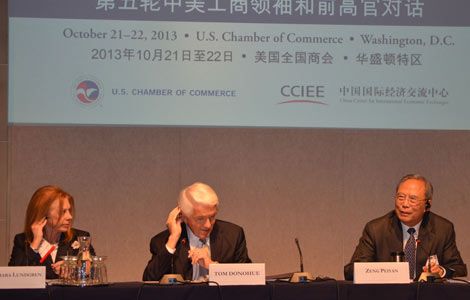Neighborly harmony
Updated: 2013-10-23 07:11
(China Daily)
|
||||||||
Premier Li Keqiang welcomed three heads of government on Tuesday in a rare diplomatic coincidence. That the distinguished guests are from three of our immediate neighbors - India, Mongolia and Russia - made the occasion even more special.
This is not just a hallmark of the diplomatic vibrancy of a new leadership. It also, and more importantly, highlights a strong aspiration for harmony in our neighborhood and a pragmatic approach to achieving it.
Indian Prime Minister Manmohan Singh, Mongolian Prime Minister Norov Altankhuyag and Russian Prime Minister Dmitry Medvedev have different topics on their agendas, but everything boils down to honoring vows of partnership.
Despite the differences in ideologies, national conditions, strategic concerns and sometimes suspicion, China has secured a strategic partnership with all the three significant neighbors.
In truth, the exchanges of vows of partnership are overcoming obstacles in bilateral ties. Closer interactions, both at leader-to-leader and people-to-people levels, remain the most effective means of confidence building.
Medvedev's online chat with Chinese netizens on Tuesday and Singh's scheduled speech at the central Party school show signs of special intimacy to promote mutual understanding.
China and India may find some degree of competition inevitable given their similar industrial structures. But distractions such as sporadic shows of disagreements can never overshadow common public aspiration, strong political will and closer economic cooperation. And mutual trust is building up in the security area.
China and Russia have supported each other on the global stage on issues of common concern. Their promise of all-round partnership calls for more concerted follow-up efforts. Energy and technological cooperation and mutual investments, in particular, have huge potential to be tapped.
While the talk of partnership dwells overwhelmingly on showcasing the desire for further rapport, the visits of the three heads of government are practical ways to enrich and consolidate such commitments.
The visits are yielding a host of bilateral agreements. But the significance of these visits will extend far beyond, especially when there is further progress on the proposed Bangladesh-China-India-Myanmar Economic Corridor and the Silk Road Economic Belt.
(China Daily 10/23/2013 page8)
 Apple unveils new Macs, iPad ahead of holidays
Apple unveils new Macs, iPad ahead of holidays
 Smart cities to aid urbanization
Smart cities to aid urbanization
 In control & breaking the mold
In control & breaking the mold
 Higher retirement age may help solve pension problem
Higher retirement age may help solve pension problem
 Northeast remains shrouded in smog for third straight day
Northeast remains shrouded in smog for third straight day
 Beijing Opera troupe perform in Brazil
Beijing Opera troupe perform in Brazil
 Nature's masterpieces
Nature's masterpieces
 Riot police off to Libya peacekeeping mission
Riot police off to Libya peacekeeping mission
Most Viewed
Editor's Picks

|

|

|

|

|

|
Today's Top News
NASA: Chinese scientists are now welcome
Yingli uses US baseball stars in campaign
Top officials promote new relations
China's US Treasury holdings hit six-month low
Graduate looks at kung fu-hip hop connection
Apple unveils new Macs, iPad
San Francisco train service restarts after strike
China, Russia reach big oil deal
US Weekly

|

|





